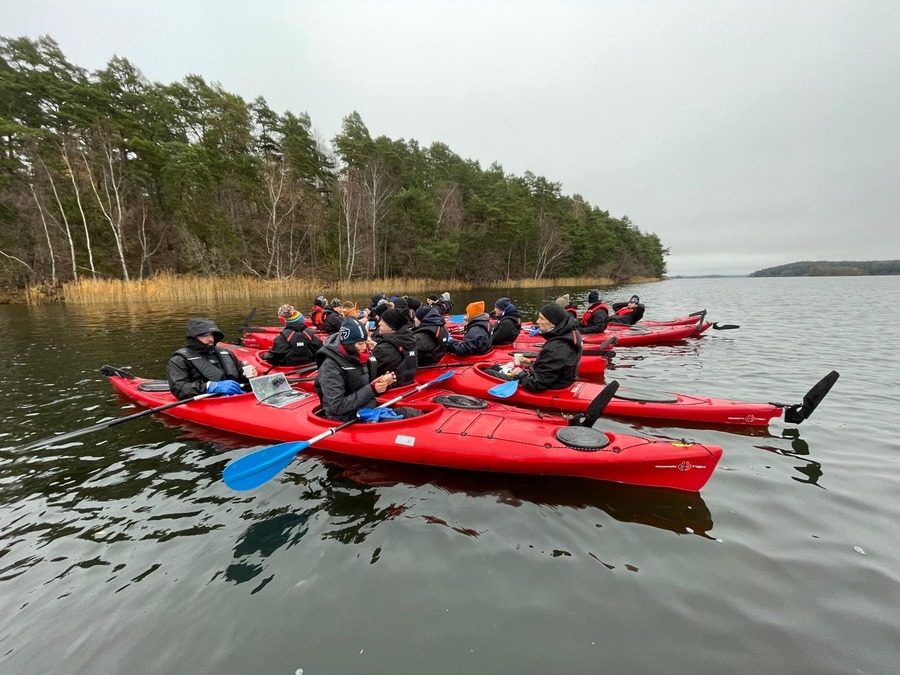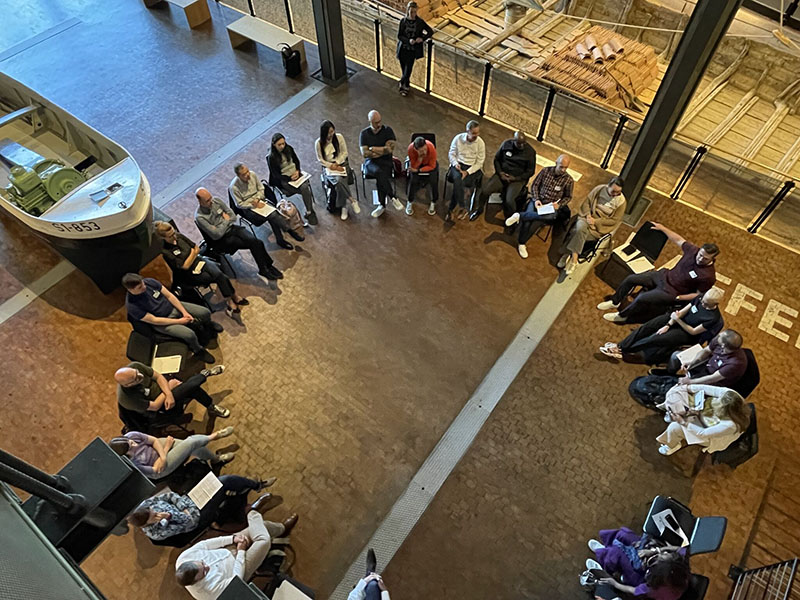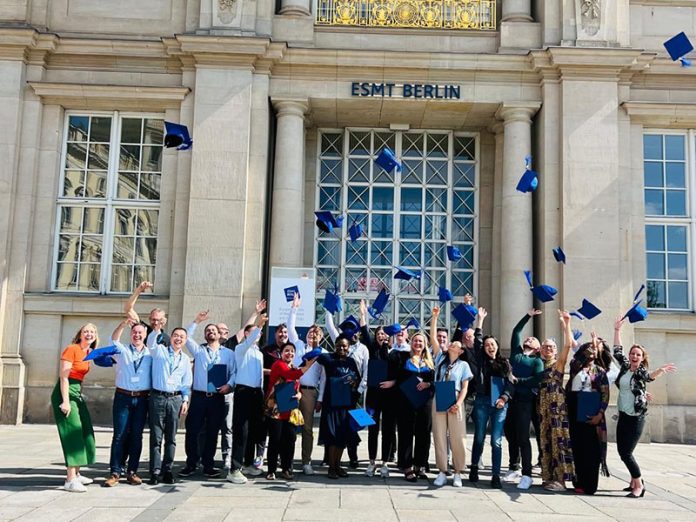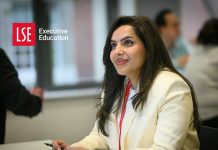The Executive Transition Program (ETP) is one of ESMT Berlin’s flagship executive education programs. Running for more than 20 years, the program has helped more than 500 senior leaders from 52 different countries prepare for the multifaceted challenges of leading large organization and teams. It’s not quite as long or intense as an MBA but the program packages the best that ESMT has to offer in a learning journey that provides participants with enough time to really work towards transformational change. It also results in an official Postgraduate Diploma.
The program is an intensive 18-day professional development journey spread over 7 months and 3 onsite modules, where participants are immersed in a series of learning experience that go beyond traditional teaching methods. This really sets the ETP apart from conventional executive education programs.
Besides the focus on learning new skills and discussing the latest academic trends and insights, a celebrated aspect includes the opportunity for participants to ask important questions about their own leadership ideas and strategies and to build strong bonds with peers on the program who face similar challenges in their roles.
The professional network that comes out of this journey is an invaluable component that many rely on during their future careers.
We wanted to shine a light on this unique program and further explore what makes it so special, so we caught up with the program director Dr. Sarah Horn and its other contributors to get an inside look on ESMT’s flagship learning experience.
Module One: Building Foundations and Bonds
Taking place in Sweden, module one of the Executive Transition Program focuses on technical general management foundations, making sure that participants from vastly different industries can refresh or expand their understanding of all functional basics while also providing an opportunity for the participants to get to know each other at a deeper level.
Dr. Sarah Horn, the program director explains:
“The executive leadership training begins with addressing technical general management knowledge gaps, fostering strong peer connections and creating a sense of shared journeying. This technical and human foundation is crucial for establishing a strong cohort and enabling vulnerable, transformational discussions during the program.”
Establishing that foundation means engaging in a range of functional deep-dives as well as a business simulation. “We kick off the program by taking everyone through a mini-MBA,” Explains Sarah Horn. This includes finance, marketing, operations and supply chain management as enablers of sales and commercialization — we explore all of these topics through the lens of sustainability.
We wrap up the module by giving participants time to reflect on what they want to get out of their ETP journey ahead, asking questions such as “what is my leadership vision?”, “what do I want to learn from faculty and my peers?”, and “where or who do I want to be at the end of the program?”
The Swedish setting of Module One enhances the developmental experiences that take place. Activities such as silent walks in the woods, kayaking, and plunging into the invigorating waters of Lake Mälaren before detoxing in the warm pool or sauna are designed to offer a space for individual reflection as well as peer-to-peer coaching and growth. After all, leadership and indeed self-leadership goes beyond having just the technical knowledge of leading a business.

“Modern leaders must demonstrate balance and master emotional self-regulation while performing under stress and uncertainty and managing increasing business and human complexities. Being a good, happy leader requires an intentional decision to embrace such role as an important responsibility and opportunity,” Dr. Horn emphasizes.
Module Two: Strategic Insights
In the second module, participants take a closer look at external forces that impact their leadership success. Discussions cover strategy, geopolitical and macroeconomic trends, change leadership, and innovation management. Additionally, new topics on the agenda include sustainability and diversity and inclusion. As always at ESMT, hands-on workshops are mixed with open plenary discussions or experiential learning moments.
Summing up the rationale behind this approach, Professor Olaf Plötner, who teaches the strategy part, explains, “Rather than memorizing different theories, executive education is about sharpening one’s saw of thinking. Being here is about daring to have an opinion, to make assumptions and to debate,”.
“We use a lot of ‘war language’ (‘picking this battle’, ‘let’s fight for…’) – which may be good to give direction and focus. But if you want to collaborate, you need to soften your tone and be mindful of cultural differences,” Plötner adds.
Module Three: Deep Dive into Self-Leadership
The final module, set in May, focuses on self-leadership with strong guidance by executive coaches and experiential learning activities. This module challenges participants to reflect deeply on their values, leadership styles and presence, and the impact their actions have on their teams, organizations and other stakeholders.
Key activities in this module include an ethical discussion at the Technik museum Berlin, exploring business ethics, responsibility, and the right to mutiny. The group also explores insights into networks and team diversity, emphasizing the productive potential of diverse perspectives with ESMT’s Konstantin Korotov and Gianluca Carnabuci.

Both summarize their exploration of leadership as follows:
“A leader’s responsibility is not only to understand but to explain their actions, especially in VUCA times. This requires deep self-knowledge and courage,” says Konstantin Korotov.
There is also a component of diversity and inclusion management involved. Usually diversity pays off if managed well. The question is, what does ‘managed well’ mean and demand from a leader?
“Diversity [after all] creates conflict, which can be productive if it’s a conflict of ideas but dysfunctional if it’s a conflict between people,” notes Gianluca Carnabuci.
In this spirit and in addition to our classroom activities, we also use the opportunity to learn from the unique city of Berlin. Key activities during this part of the program include a historic tour and exploration of the 800+ year history of Berlin to explore themes of reinvention and transformation. Also, experiencing the art and science of zero-waste food or how diversity is flourishing in one of the most liberal cities in the world are additional perks.
A Continuous Journey of Growth
The ETP journey extends beyond the program’s conclusion, with an annual alumni gathering that allows for continued growth and connection among past participants. ETP participants from all cohorts return to campus each year to experience the latest academic insights and to reconnect, share experiences, and continue their leadership development together as friends, accountability partners and champions for each other.
The ETP is more than just an executive education program; it’s a journey that equips executives with the skills, insights, and networks necessary to thrive and have a meaningful impact in today’s dynamic business environment – as senior leaders and as humans.


































